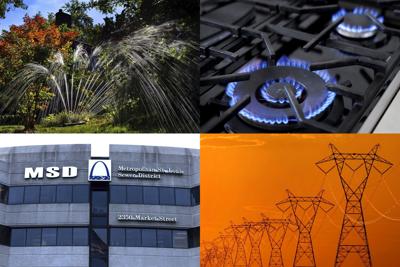If youŌĆÖre reeling from sticker shock because of rising utility bills, brace yourself: more rate hikes are on the way.
In June, new electric rates from Ameren kicked in, sending bills up by about 12%, or $14 per month for an average household, according to the company.
Ameren is not alone. Virtually all major utilities serving the ╣¹Į┤╩ėŲĄ region have piled on rate increases in the last couple of years, or soon will:
- A rate hike by Missouri American Water also took effect in June, raising monthly bills for customers across suburban ╣¹Į┤╩ėŲĄ by nearly $17, based on average water usage. That figure comes from the Missouri Office of Public Counsel, which tracks utility issues for consumers.
- Last year, voters approved a multi-year series of rate increases for the Metropolitan ╣¹Į┤╩ėŲĄ Sewer District, which will push monthly bills for customers from an average of $57 in 2024 to about $75 by 2028 ŌĆö opting for that approach, instead of a lone alternative that wouldŌĆÖve raised bills far more steeply.
- In 2023, rates for ╣¹Į┤╩ėŲĄŌĆÖ city water division were raised 44% ŌĆö from $75 to $105 per quarter, for an average homeowner ŌĆö in its first rate increase in more than a decade.
- Gas bills will soon go up as Spire prepares for a rate hike that has been agreed to, but not yet finalized, by state regulators. Under the agreement, bills across the ╣¹Į┤╩ėŲĄ region will increase by an average of more than $8, or about 11%, per month, based on calculations from the Office of Public Counsel. The increase, set to take effect in October, will largely negate a decrease in gas bills that consumers saw last year from lower fuel costs.
People are also reading…
Not including Spire bills, the recent hikes altogether have raised utility payments for typical area residents by about $30 per month ŌĆö with more increases coming.
And the sting can feel more pronounced at times, such as during summer heat waves, when electric bills jump amid high demand for cooling.
ŌĆ£Everybody is just kind of complaining,ŌĆØ said Anthony Combs, a Herculaneum resident who is seeking to reverse electric rate hikes through an online petition. He has collected almost 2,900 signatures in just about a couple of weeks, though itŌĆÖs unclear how the petition might achieve its goal.
ŌĆ£It seems like every time I get some sort of raise in my career or something, something comes and gets it,ŌĆØ Combs said. ŌĆ£I just wonder, when is enough enough?ŌĆØ
Local utilities say the hikes are necessary for investments to improve service or reliability, such as upgrading the electric grid or replacing old pipes.
ŌĆ£Keeping bills affordable for our customers is important to us. ... We consistently review our customer assistance programs to help meet the needs of our customers and work with consumer advocates and community partners to provide assistance,ŌĆØ said Molly Rose, a Spire spokesperson, in a statement.
MSD tries to strike a balance, said spokesperson Bess McCoy.
ŌĆ£We take seriously our responsibility to provide an essential service while keeping rates as affordable as possible,ŌĆØ she said, in a statement.
Rates, profits increasing
Monopoly utility companies, such as Ameren and Spire, canŌĆÖt raise rates on their own. Regulators at the Missouri Public Service Commission review utilitiesŌĆÖ rate increase requests. The companies have to submit reams of financial information showing why an increase is warranted and what the money would be used for.
Ameren, for example, said its recent rate increase was necessary for significant investments to address ŌĆ£numerous aging grid assets and specific reliability concerns in certain areas.ŌĆØ And Spire argues it needs a rate hike to recover investments in system improvements and to stay financially healthy.
In recent years, utilities have also cited rising costs associated with their projects.
If deemed prudent by regulators, investor-owned utilities like Ameren, Spire and Missouri American Water are allowed to earn a certain profit margin on capital investments, but not from the actual commodities they provide, like water or energy.
The PSCŌĆÖs review process, which takes about a year, includes input from consumer advocates, the public and other parties. The increases granted are typically lower than the companiesŌĆÖ initial requests.
ŌĆ£Clearly, the Commission is concerned with overall affordability,ŌĆØ Forrest Gossett, a PSC spokesman, said in a statement. ŌĆ£But each utility rate request is decided on the merits of that particular case.ŌĆØ
The agency will discuss the topic at an October summit in Jefferson City on statewide energy issues, he said.
The rate increases come amid steady profit growth for the utility companies.
In its latest annual report, Ameren reported a net income of $1.19 billion in 2024, up from $1.16 billion the year before. The company pointed to increased Missouri electric rate revenues authorized in June 2023 as one factor that boosted net income.
It also cited increased infrastructure investments, decreased costs, and a jump in electric sales at Ameren Missouri, as other positive contributors.
Spire, meanwhile, reported $251 million in net income for its last fiscal year, which ended Sept. 30. ThatŌĆÖs up from $218 million the year before, and $221 million the year before that.
And the American Water Works Co., the owner of Missouri American Water, reported a net income of $1.05 billion last year, compared with $944 million the year before and $820 million the year before that.
Consumers like Combs, the petition organizer, are disgruntled seeing rising utility profits, particularly as families struggle to contend with growing bills.
ŌĆ£We donŌĆÖt have a choice,ŌĆØ he said, referring to the relationship between monopoly utilities and their customers. ŌĆ£Some regulation needs to happen to at least give some relief to these families. ... I donŌĆÖt know how families are going to survive if theyŌĆÖre continually squeezed to death.ŌĆØ
Help with bills
Beyond the regionŌĆÖs investor-owned utilities, others like MSD and the ╣¹Į┤╩ėŲĄ water division cite financial obligations to justify rate hikes.
The ╣¹Į┤╩ėŲĄ water division raised bills to chip away at its significant operating deficit. And city officials said at the end of July the department will resume turning off water service for some residents who havenŌĆÖt paid their bills, ending a five-year pandemic moratorium.
The move, the Post-Dispatch reported, has been seen by officials as increasingly necessary as delinquency has risen over the years. A quarter of water bills are currently going unpaid, and the total owed is nearly $13 million, or more than 14% of the water divisionŌĆÖs projected budget this year.
MSD must spend billions of dollars on required investments in infrastructure, spread over decades, following a legal agreement aimed at cutting down on sewer overflows.
As bills rise, it could get trickier for some residents to find financial assistance, as ŌĆ£lifelineŌĆØ sources of funding, such as the Low Income Home Energy Assistance Program, are threatened amid cost-cutting by the Trump administration.
The administration is pushing to end the program, which distributed $136 million in Missouri in 2023, providing an average benefit of $675 per household.
Still, utilities like Missouri American Water, Spire and Ameren all say they can help with other financial assistance.
ŌĆ£DonŌĆÖt wait until youŌĆÖre in crisis,ŌĆØ said Page Selby, a manager of customer advocacy for Ameren. ŌĆ£Reach out as soon as you know this bill is going to be a challenge, because thereŌĆÖs lots of options.ŌĆØ
She also pointed to tools like the companyŌĆÖs online dashboard, which can help customers better understand details of their bills and energy usage. Utilities typically offer budget billing options, as well, that help customers make more even payments throughout the year, and dodge large, seasonal swings.
Looking ahead, additional policy changes could push utility bills higher. At the federal level, for example, energy experts have said that the upcoming loss of tax breaks for wind and solar power will lead to higher energy costs as many new projects still go forward.
And at the state level, a bill signed by Gov. Mike Kehoe will allow utilities to charge customers for projects like new power plants as they are built, instead of waiting until theyŌĆÖre finished and in service. Consumer advocates say the new law could raise utility bills by $1,000 per year for a typical household. It takes effect on Aug. 28.
Editor's note: This story has been corrected to say the average monthly rate increase for ╣¹Į┤╩ėŲĄ regional Spire customers rounds to $8.┬Ā















